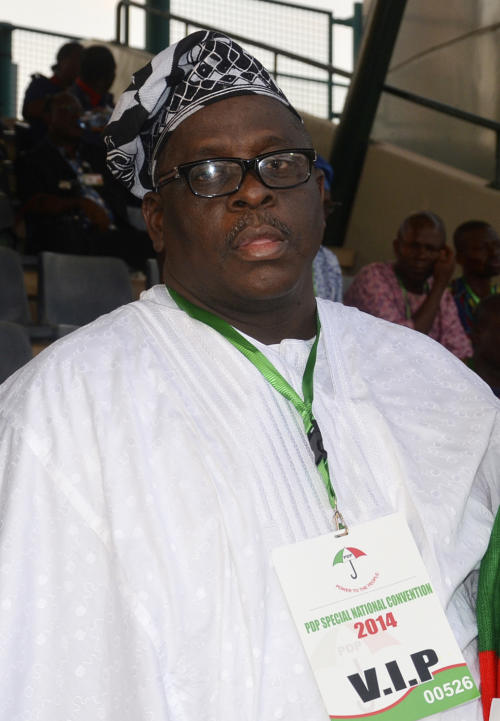
In
this photo taken Sunday, Oct, 12, 2014, Buruji Kashamu attends a
primary election event for Nigerian President Goodluck Jonathan, Abuja,
Nigeria. Kashamu, who is indicted in the U.S. for allegedly smuggling
heroin in a court case that was the basis for the TV hit "Orange Is The
New Black," has been elected a senator in Nigeria. Election results
posted late Wednesday, April 15, 2015 identify Kashamu as a
senator-elect in southwest Ogun state. Opponents are challenging his
victory in court, saying ballots were rigged. (AP Photo)
A
man indicted in the United States for allegedly smuggling heroin, in a
case that was the basis for the TV hit "Orange Is The New Black," has
been elected a senator in Nigeria.
Buruji
Kashamu was little known before he returned home in 2003 from Britain,
where he beat a U.S. extradition order, to become a major financier of
President Goodluck Jonathan's party.
Election
results posted late Wednesday identified Kashamu as senator-elect in
southwest Ogun state. Opponents are challenging his victory in court,
saying ballots were rigged.
Kashamu's
spokesman, Austin Oniyokor, said it was important to clarify there is
not "any order for extradition by any court whether in Nigeria, or the
U.K. or the U.S. or anywhere."
Kashamu,
56, has said the 1998 indictment by a grand jury in the Northern
District of Illinois for conspiracy to import and distribute heroin in
the United States is a case of mistaken identity. He has said Chicago
prosecutors really want the dead brother he closely resembles.
A
British court refused a U.S. extradition request in 2003 over
uncertainty about Kashamu's identity, freeing him after five years in
jail. He was found carrying $230,000 when he was arrested.
Kashamu
said that court found the United States had withheld evidence that a
chief conspirator had failed to identify him in a photo lineup. U.S.
court papers only say that Kashamu was identified by two conspirators.
Last
year, Chicago Judge Richard Posner refused a motion to dismiss
Kashamu's case. The September 2014 decision from the Court of Appeal 7th
Circuit quoted the U.S. Justice Department as saying that "the
prospects for extradition have recently improved" but noted that "Given
Kashamu's prominence ... the probability of extradition may actually be
low."
It
said that if Kashamu was the ringleader of the drug gang, he could face
a sentence as heavy as life imprisonment and suggested that if he is
innocent he should fly to Chicago to prove it in court.
A
dozen people long ago pleaded guilty in the case including American
Piper Kerman, whose memoir about her jail time was adapted for the
Netflix hit "Orange Is The New Black." Kerman's book never identified
Kashamu by name, but there is a West African drug kingpin whom she calls
"Alhaji" — meaning one who has completed the haj or pilgrimage to
Mecca.
Kashamu said in a statement to the AP that he already has been exonerated by the British court.
"I
have never lived in or visited the United States of America and have
never been involved in any narcotics or criminal activities in the
United States of America," he said. "I am a free citizen of Nigeria, an
employer of labor and a politician with legitimate sources of income. I
do not have anything to hide. I am neither afraid of anyone nor am I
running away from the law."
Former
Nigerian President Olusegun Obasanjo has chastised President Jonathan
for his perceived protection of Kashamu and warned that "drug barons ...
will buy candidates, parties and eventually buy power or be in power
themselves."
Kashamu
has said that Obasanjo did not call him a drug baron while he spent
some $20 million ensuring their party's success at 2011 elections.
Kashamu
is suing Obasanjo for libel for stating that he is a fugitive from U.S.
justice. He had won a court order halting publication of Obasanjo's
autobiography but a judge this week rescinded it, saying Kashamu had
misled the court.
President-elect
Muhammadu Buhari, a former military dictator, has promised to fight
corruption. That has alarmed many politicians in a country where
corruption is endemic.
No comments:
Post a Comment